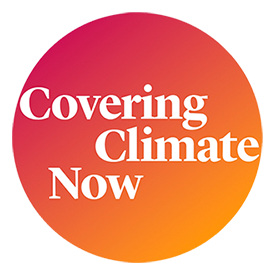 This column is part of Covering Climate Now, a global journalism collaboration cofounded by Columbia Journalism Review and The Nation to strengthen coverage of the climate story.
This column is part of Covering Climate Now, a global journalism collaboration cofounded by Columbia Journalism Review and The Nation to strengthen coverage of the climate story.
I had my first experience with death when I was 4 years old. My 14-year-old cousin, who carried me around on his shoulders and poured me cereal in the morning, was shot in the head by the boy who lived across the street from him in Birmingham, Ala. I remember the first half of his funeral, the violins and overwhelming sadness in the air. I have no memory of it, but my mother tells me I cried so hard that I had to be carried out. Afterward, the family conversation shifted from one of mourning to one of punishment, and it was the first time I’d heard of prisons. Even though I didn’t understand death, I did understand that putting the boy across the street in prison was not going to bring my cousin back, and it was not going to heal my family.
As a “geriatric millennial,” I had a childhood animated by warnings about the hole in the ozone layer, which my generation would somehow solve by planting trees and cleaning up litter. Somewhere around high school, we stopped fretting about the ozone and started worrying about global warming. By the time I got to college, I knew the energy supply was the problem, but I was good and grown when I realized that it’s the fossil fuel industry, with its decades of disinformation campaigns and willful human rights abuses, that was almost entirely to blame.
On the surface, it might seem like prison abolition and fossil fuel abolition have nothing in common, but they couldn’t be more related. For starters, they both hit Black communities especially hard. And that’s no accident: With the discovery of oil in Pennsylvania in 1859, both fossil fuels and prison system sprang from the dust of American chattel slavery. In fact, the Civil War was the first war in which fossil fuels had any role. As Chris Hayes wrote in The Nation in 2014, “Before the widespread use of fossil fuels, slaves were one of the main sources of energy (if not the main source) for societies stretching back millennia.” And some of what couldn’t be powered by coal or oil was absorbed by incarcerated workers in the prison system.
And the two converge again in the face of climate change. Prison labor is the backbone of disaster response plans from wildfires to hurricanes. At the same time, prisoners are one of the most vulnerable populations in the face of extreme weather. Even in the hottest climates, prisons often lack air-conditioning, creating hellish living conditions that we know increases the likelihood of violent outbursts. In Louisiana, it’s increased incidences of self-harm. In New York, inmates at Rikers Island were punished for simply taking off their shirts to cope with the scorching heat. (They don’t fare better in extreme cold either.) When it comes to evacuations, there are no federal guidelines for prisons. I know I will never forget the horror stories from Orleans Parish Prison in the wake of Hurricane Katrina.
I usually hate words that start in the negative, but when I think of how ugly fossil fuels and prisons are, “abolition” sounds beautiful. It signals the removal of an obstacle, the cleaning of a slate, the possibility of something new.
Because that’s the thing about abolition—and something I believe abolitionists know all too well—it’s not enough. Abolition is a starting point. It’s stopping the violence so that we can treat the wound. It’s not enough to get rid of fossil fuels or prisons. We have to get rid of white supremacy and toxic individualism and extractivism.
We have to get rid of this world where human beings are disposable, but systems that we know to be harmful are indispensable. I am a prison abolitionist, because I believe no human being is unforgivable, and I am a fossil fuel abolitionist, because I believe no oil company is forgivable.
Climate change demands that we rethink everything, and it only makes sense to do so holistically. I think the acute and chronic crises of climate change and the prison industrial complex reveal what happens when you pussyfoot around a systemic problem like slavery. All you do is bury the problem until it becomes too big to stay hidden. Imagine if we’d solved for white supremacy with the defeat of the Confederacy?
And that’s why conversations around abolition are so controversial: They test the limits of our imagination. If you dare to talk about abolishing fossil fuels or prisons, people demand that you have a 10-point plan for what replaces them, thus stymying the conversation. It’s like demanding that a violently ill person have a full recovery plan before taking them to the hospital. Of course, we need to figure out what comes next, but you don’t have to know all the solutions before you can talk about the problem. And problems this glaring rarely have simple solutions.
I don’t know everything that comes after prisons or after fossil fuels, but I know there’s something deeply wrong with society if we can lock one another in dungeons and call it justice or burn literal fossils and call it power. I know I want a world where justice looks more like healing, and I know we can’t heal until we stop the bleeding.


